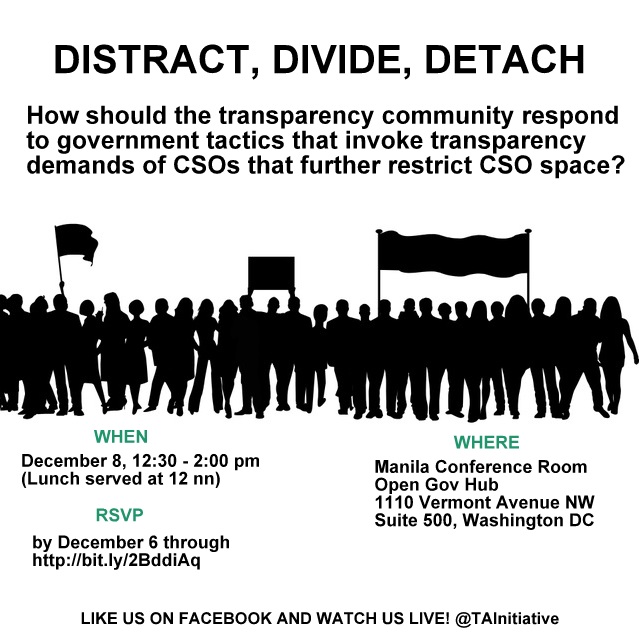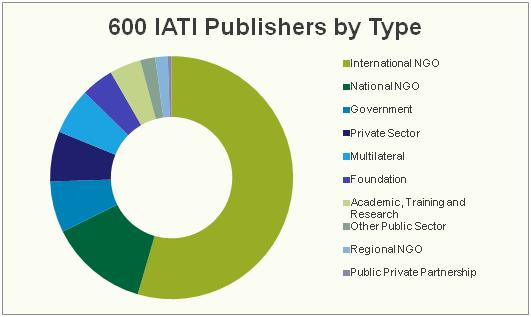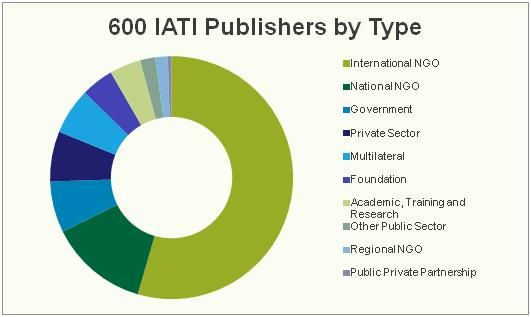TAI spotlight…
- Q&A: The Open Society Foundations in a Changing Europe | Open Society Foundations
Regional Director Jordi Vaquer assesses OSF’s Europe program five years since its establishment. Why is OSF vulnerable to attack in continental Europe?
- Technology and Social Justice: Meet our Tech Fellows | Ford Foundation
Ford Foundation embedded technologists in its grantmaking teams to better understand the increasing influence of data and technology on social justice issues. Check out a tech fellow’s perspective on technology being political and not neutral.
- We Need to Solve Real-World Problems in a Joined Up Way by Publish What You Fund | Omidyar Network
ON Grantee PWYF talks about the progress with Joined-Up Data Standards project on fostering collaboration on the interoperability of international data standards
- Technology is not neutral—it’s political | Ford Foundation
Ford Foundation Tech Fellow Ritse Erumi talks about her views on intersection of social justice and technology
- Rebuttal of the October 9 National Consultation in Hungary | Open Society Foundations
George Soros’ camp responds to Hungary’s smear campaign of the philanthropist
- Join TAI on December 8 for the launch of its latest report! RSVP by December 6!

In case you missed it…
The open government honeymoon period is over. That is according to Nathaniel Heller. Yes, the Regional Americas meeting of Open Government Partnership attracted a healthy turnout in Buenos Aires last week (not just for a taste of spring weather and alfajores we hope), but the movement cannot escape the rapid political shifts that are triggering healthy introspection and self-doubt among open government advocates on the new way of “doing government.” Even in country contexts lauded for their progress on open government, dissatisfaction can reign. Anne Applebaum highlights the frustration of anti-corruption activists in the Ukraine. As one MP noted, “A lot of things have been started but we don’t have the feeling that they are irreversible.” However, Sherina Rathor argues that truth and transparency are more important than ever in the current climate, not least given revelations of sexual assault around the world, and that openness can lead to a “better way of living.” How does the OGP strategic refresh still resonate amid these evolving debates?
Our round up of “opening up” stories – Kyrgyz Republic, Philippine, Africa, Puerto Rico, West Balkans and the UK. The Open Government Partnership welcomed its newest member (and the first to join from Central Asia) – Kyrgyz Republic. Yet they should be aware that it could be a bumpy road ahead – Michael Aguinaldo of the Philippine Commission on Audit reflects on their challenging experience in implementing the Citizen Participatory Audit. In Africa, Oxfam Nigeria lauds the Federal Government for adopting the Open Contracting Data Standard, and in Ghana, the Ministry of Energy announced the launching of the legal and regulatory framework for the oil and gas sector by June 2018. What happens when transparency does lead to action? Things can still be complicated. Remember Whitefish Energy – the small firm from Montana awarded a huge contract to rebuild hurricane-ravaged Puerto Rico’s electricity grid? While outcry led to the cancellation of the contract and an FBI investigation, they just resumed work after stalling for an $83m payment owed by the state government.
The Westminster Foundation for Democracy published the Regional Road Map on Good Governance for the Western Balkans, which includes recommendations on increasing transparency and openness. While for an assessment of governance in Africa, check out the Ibrahim Index of African Governance site – you can now explore numbers from 2000 to 2016.
Our number for the week – 600. IATI just reached its 600th publisher! A long way since it was established nine years ago. The NGO sector is the largest publisher. DFID was the first publisher in IATI, in 2011 and the UK has been making strides in its efforts towards a fully transparent government. This month, its autumn budget has been made public.

Talking of the UK budget, UK Chancellor Philip Hammond used the occasion to announce a corporate tax reduction from 28 percent to 19 percent – one point lower than the rate in proposed US legislation. Coincidence or are we already seeing a race to the bottom on tax extended to OECD countries? Might such moves already further inequality? A new study flags that inequality has been increasing over a thousand years, with millennials more likely to suffer the worst income inequality of any generation.
The Economist welcomes increased scrutiny of offshore financial centers amid the revelations, digs into the debate on whether tax havens offer any social utility, but rightly caution against an overly strong offshore focus – much larger dealings merit exposure in the likes of London and Miami.
The Paradise Papers may have helped further raise awareness of tax evasion, but the OECD is optimistic that this is a “legacy that is fast being dismantled”, citing tax cooperation among countries to close loopholes through the Base Erosion and Profit Shifting (BEPS) Project and the Automatic Exchange of Information (AEoI). The Global Forum on Transparency Exchange of Information for Tax Purposes just released its Plan of Action for Developing Countries in AEOI.
How much good is such tax information on its own? Combinations of datasets tell a complete story. For example, as Alex Gillies of Natural Resources Governance Institute notes in this Q&A, building on a report on the twelve corruption risks in the award of extractive sector licenses and contracts, we need “lots of transparency” and quality information in the oil sector to “enable a well-informed and constructive public debate and help prevent any one group from writing its own version of events.”
To that end, as the UK reviews its mandatory disclosure regulations, Publish What You Fund and transparency champions have made written submissions calling on the country to uphold its role in the fight against corruption in the global extractives sector. Check out their recommendations. Alex Malden also emphasizes the need to look into commodities trading payments (one area where the UK government attests to want to do more). Transparency International meanwhile released its assessment of Kenya’s Beneficial Ownership Transparency Legal Framework against the ten Beneficial Ownership Transparency Principles.
Yet what if datasets cannot be made to speak to each other? The Joined-Up Data Standards (JUDS) project explores the frontiers of data interoperability for sustainable development: consolidating existing principles, moving beyond exposing problems and towards solving them, turning big ideas into practical solutions, producing global standards that work for all, and creating adaptable partnerships. Their report focusing on SDG data interoperability offers broader lessons, including principles for implementing interoperability solutions. This issue of interoperability was one of the themes flagged by practitioners and funders in a discussion on data for accountability on the sidelines of the OGP Americas meeting – thanks to ILDA, Global Integrity and Open Data Charter for partnering in forging the conversation. There appears to be an appetite to dig deeper on specific challenges grantees face.
Who is governing all these data? Michael Hiskey chimes in with a review of the history of data governance, concerned that he who rules the data rules the world. David Ignatius looks at these issues from a journalist’s perspective and asks if it is time to adopt the “digital provenance” processes from the art world to the provenance of facts. Why not employ machine learning to flag anomalies and trace back evidence of manipulation? Could news organizations have a score for reliability weighted by the digital system?
Meanwhile, recognizing that our personal data is valuable and that the data brokerage industry is raking in billions, Saadia Madsbjerg argues it’s time for data tax.
Steps in the US to end net neutrality may not help matters, not least given consternation that the debate over this shift by the Federal Communications Commission may have been manipulated with as many as a million submitted comments faked.
Where does the world of evidence fit into these “post-truth” debates? The Centre for Development Impact may have some answers – check out this expert panel on the role of data in today’s “emerging reality”.
On the closing civic space agenda, in Turkey’s capital, Ankara, the governor has banned all kinds of LGBT activities, citing “public security” as the main reason. Meanwhile, Transparency International recently released a statement seeking to amend Palestine’s Electronic Crimes Law, which the group argues is being used to justify attacks by the Palestinian Authority on media freedom and free speech. A case has been filed against the Russian government at the European Court of Human Rights for blocking internet content.
The right of civil society organizations to secure funding is part of the right to freedom of association. But how is CSO fundraising regulated? Towards a better environment for fundraising, the European Center for Not-for-Profit Law released an extensive comparative study of legal frameworks for fundraising in Europe.
Why should funders provide its grantees unique identifiers? Mor Rubinstein of 360Giving explains how this can improve the quality and value of grantmaking data.
Of potential interest…
- November 2017 Taxcast – Tax Justice Network’s latest podcast touches on the Paradise Papers and democracy
- How Do Open Data Measurements Help Water Advocates to Advance their Mission? -How useful is the Global Open Data Index for stakeholders working on water issues in South Asia?
- UK Mining Firm in Court Over Claims it Mistreated Environmental Activists – UK mining company Xstrata, now owned by Glencore, faces raps for allegedly hiring security forces to harass environmental activists
- The Trust Project Launches Transparency Standards to Help Readers Identify Reliable News Sources – Global consortium of news organizations released the Trust Indicators
- Can Facebook, Twitter Crack Down on Deception? – Joshua Brustein gives an overview of the extent of the problem, what’s being done and what can be done to address misinformation.
- The War on Aid: The Hidden Battle Inside Priti Patel’s Own Department – The British aid model, while not perfect, has run the most ambitious aid policy for two decades. Where is it headed?
Calls: Proposals, papers, and course invites…
- Collaborative Action Research on Citizen Action for Equitable Budgets – Deadline: December 22
- Empowering Data Leaders Through Mentorship – Deadline: December 22
- The Partnerships for Enhanced Engagement in Research (PEER)– Deadline: January 12, 2018
- Advocate Europe – Deadline: January 16, 2018
- Innovations in Participatory Democracy Conference – Deadline: March 8-10 (Phoenix, Arizona, USA)
On the calendar…
